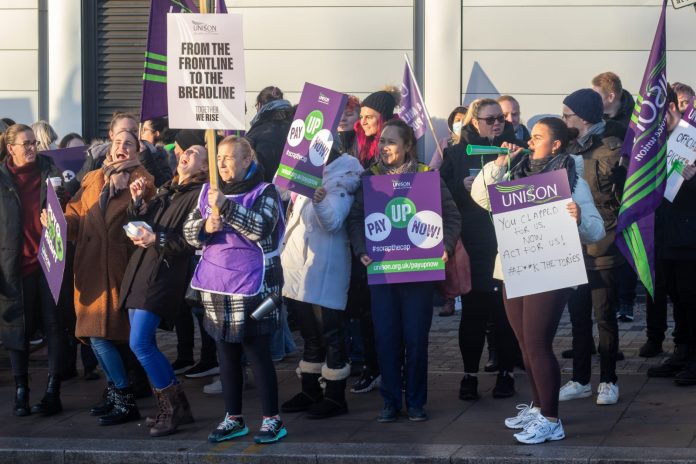Adrian O’Malley, Unison Health Service group executive, personal capacity; standing for NEC national health service general seat, in the Unison elections
Unison health conference took place in Bournemouth from 17 April. The background to the conference was the announcement of a three-to-one vote by NHS members to accept a pay deal covering years 2022-23 and 2023-24.
The deal would close down the 2022-23 dispute, with an unconsolidated lump sum starting at £1,665 and a below-inflation pay rise of 5% for 2023-24.
The deal was recommended by the leaders of all the NHS unions except for Unite. However, Socialist Party members on the Health Service Group Executive had argued to reject, and the vote to recommend acceptance was carried by a close vote, 20-15.
On the same day as Unison accepted the deal, the RCN announced that its members had rejected the deal, and reinstated its strike action over the May Day bank holiday.
An emergency motion accepting the deal and planning for the 2024-25 pay year was carried at conference. A critical motion was ruled out, but the debate did reflect members’ anger and frustration. The deal was criticised in contributions from delegates during the conference.
Unison General Secretary Christina McAnea responded in her address to conference by saying: “To those who never have anything good to say, stop talking down our union!”
Even delegates who supported the deal found it hard to celebrate. “A great offer? No! What we wanted? No!” said one delegate, who then went on to say we won’t get any more from a Tory government. On the contrary, Socialist Party members and many others had campaigned for reject, because with a determined lead, more could be won from this broken government.
Delegates spoke on the need to support the RCN and BMA in their strikes, and give supportive advice to Unison members who refuse to cross their picket lines.
The 5% rise for 2023-24 was condemned for doing nothing to address low pay and the shortage of staff, in particular nurses.
The main message of conference was to keep up the fight and prepare for future battles on pay.
Conference unanimously agreed to withdraw Unison from the NHS Pay Review Body (PRB – an unelected body of handpicked supposed ‘experts’) as soon as possible and to negotiate directly with the government on pay. This in itself is a reflection of the pressure from members on the leadership, which has gone along with the PRB for years previously.
Local disputes over the banding of health care assistants and others are spreading across the country.
The right-wing leadership of Unison health is deluded if it thinks a Labour government will come to its aid and deliver decent pay rises for NHS workers. Even in the last couple of days, Starmerite Labour shadow health secretary Wes Streeting has refused to back the RCN strikes.
There is a steely determination among Unison health activists to continue to battle on pay and ensure future ballots are successful. On the SGE, we will be holding the right-wing majority to account. The countdown begins now to next year’s pay claim and beyond.
The message of conference is change will have to come from below. The forthcoming NEC elections give members a chance to elect a leadership that is prepared to fight with them.
Socialist Party candidates for Unison’s NEC:
Hugo Pierre, national black members’ male seat
April Ashley, national black members’ female seat
Adrian O’Malley, national health service general seat
Paul Couchman, national local government male seat
David Maples, national disabled members’ general seat
Jim McFarlane, Scotland male seat
Mary McCusker, Scotland female seat
Naomi Byron, Greater London reserved seat
Tom Hunt, East Midlands region male seat








